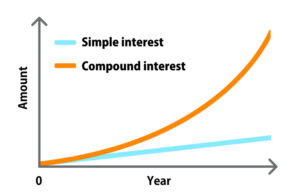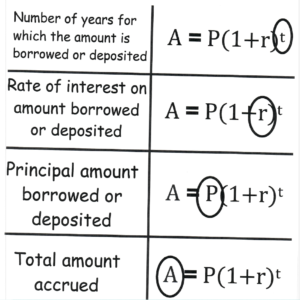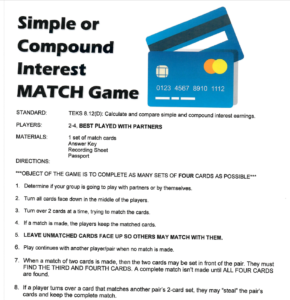Games for Simple & Compound Interest
Why would a student be learning how to calculate simple and compound interest?

Understanding simple and compound interest can be very helpful in managing personal finances and making informed decisions about borrowing and investing.
Simple interest is useful for calculating the interest on a loan or investment where the interest is only calculated on the principal amount. It can help you understand the cost of borrowing and the return on a simple investment.
Compound interest, on the other hand, takes into account not only the initial principal but also the accumulated interest from previous periods. This means that interest is calculated on both the initial amount and the interest that has been added to it. Understanding compound interest can help you see the long-term effects of saving and investing, and the benefits of starting to save and invest early.
By understanding these concepts, you can make more informed decisions about borrowing money, saving for the future, and investing for long-term financial goals.
SNOOZE!!! 😴
The above paragraphs explained why it’s an important concept to learn, but knowing this information is not going to incite an eighth grader into learning it! Since this concept is being taught and tested in classrooms across the United States and the world, students need to be engaged in a fun, hands-on way of learning about simple and compound interest.
🦸🏽Hands-On Games to the Rescue!
The vocabulary of simple and compound interest is KEY to calculating and comparing simple and compound interest earnings and savings. I created a Simple & Compound Interest Vocabulary Match Game that requires a 2-Way Match to win a set of cards with another player’s ability to “steal” a set of cards before all four cards in a set are found. Unmatched cards are left face up which requires all players to reread the cards on the board. IMPRESSION! IMPRESSION! IMPRESSION! Students will learn the vocabulary WHILE HAVING FUN!
Identifying the parts of a simple or compound interest word problem and the way these components are used in an equation will help every student with simple and compound interest. That is EXACTLY what Simple or Compound Interest MATCH Game does for your learners!

This game is FUN because it requires 4-card match with the ability to “steal” another player’s cards and win the game! A recording sheet that asks players to calculate and compare simple and compound interest keeps accountability and rigor part of your curriculum.
Who knew that simple and compound interest could be rigorous AND so much fun???


